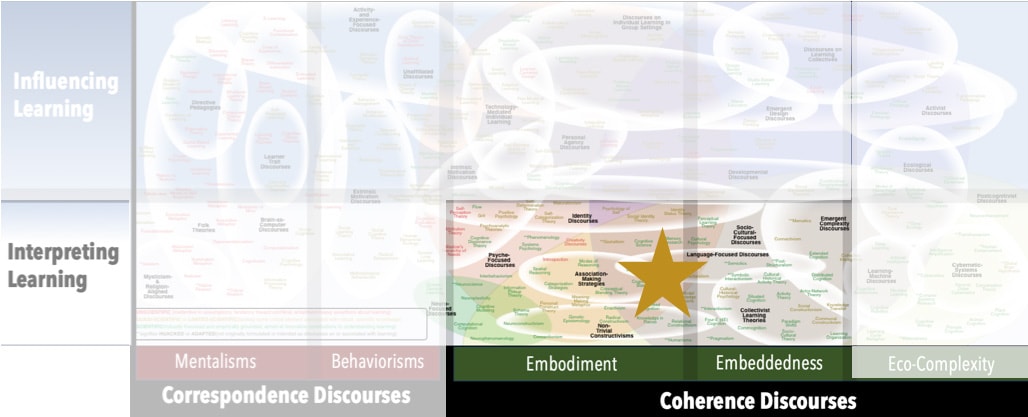Focus
Statuses/modes of adolescent identityPrincipal Metaphors
- Knowledge is … range of possible identity statuses
- Knowing is … an identity status
- Learner is … an adolescent
- Learning is … exploring identifications
- Teaching is … N/A
Originated
1960sSynopsis
Identity Status Theory is an elaboration of Psychosocial Development Theory. Identity Status Theory replaces the suggestion that adolescence involves a need to resolve an “Identity vs. Role Confusion” tension with the assertion that adolescence is more about exploration of identifications from a range of life domains (e.g., social groups, religion, vocation, gender roles). Four identity statuses are proposed, differentiated according to whether one has (1) explored identity options and (2) committed to an identity:- Identity Diffusion (James Marcia, 1960s) – the least mature status of Identity Status Theory, applied to those who have neither explored identity options not committed to an identity. Prolonged Identity Diffusion is associated with low self-esteem, self-absorption, and poor social relationships.
- Identity Foreclosure (James Marcia, 1960s) – in Identity Status Theory, the status of one who has not explored identity options, but who has committed to an identity. Prolonged Identity Foreclosure is associated with conformity, resistance to change, and uncritical thinking.
- Identity Moratorium (James Marcia, 1960s) – in Identity Status Theory, the status of one who is exploring identity options, but who has not committed to an identity. This status is associated with uncooperative attitudes, anxiety, and uncertainty.
- Identity Achievement (James Marcia, 1960s) – in Identity Status Theory, the status of one who has both explored identity options and committed to an identity
- Dysphoria (Dysphoric Mood) – an emotional state characterized by profound unease, dissatisfaction, and/or sadness with oneself-in-one’s-situation. Specific types include:
- Gender Dysphoria – the distress experienced by a person whose sense of their own gender does not match with their sex assigned at birth
- Species Dysphoria (Body Dysmorphic Disorder) – the distress experienced by a person who feels their body is of the wrong species
Commentary
As with many 20th-century Developmental Discourses, the research subjects for Identity Status Theory were mainly white American males, presenting complex gender, racial, classist, and cultural limitations.Authors and/or Prominent Influences
James MarciaStatus as a Theory of Learning
Identity Status Theory is a theory of learning … mainly about oneself.Status as a Theory of Teaching
Identity Status Theory is not a theory of teaching.Status as a Scientific Theory
Identity Status Theory has a very limited empirical basis, although it has a strong intuitive appeal in western societies.Subdiscourses:
- Dysphoria (Dysphoric Mood)
- Gender Dysphoria
- Identity Achievement
- Identity Diffusion
- Identity Foreclosure
- Identity Moratorium
- Species Dysphoria (Body Dysmorphic Disorder)
Map Location

Please cite this article as:
Davis, B., & Francis, K. (2024). “Identity Status Theory” in Discourses on Learning in Education. https://learningdiscourses.com.
⇦ Back to Map
⇦ Back to List
